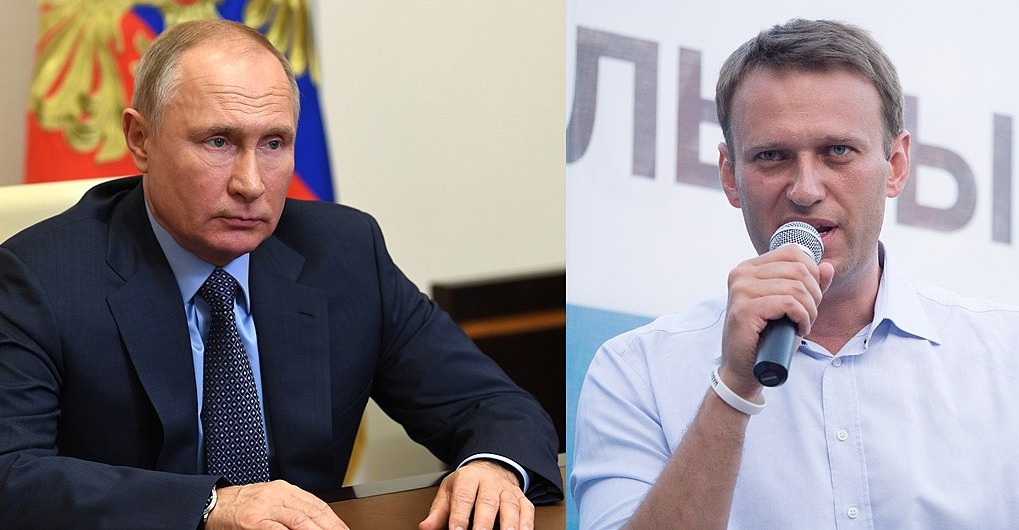
To the surprise of no one in the world of Kremlin-watching, a Moscow court ordered Russian President Vladimir Putin’s harshest critic to prison for 2 ½ years for violating the terms of his suspended sentence in a bogus embezzlement case.
Alexei Navalny’s conviction and sentencing at a chaotic hearing on Tuesday aims to punish the defiant opposition leader for a probation breach in August, when he was comatose at a Siberian hospital from poisoning by a Soviet-era nerve agent. His supporters called in German medical personnel who evacuated the unconscious victim to Berlin – an unreported change in whereabouts that constituted a violation of his probation.
The court issued its ruling after 8 p.m. in Moscow, hours after a hearing at which Navalny called Putin a “poisoner” and warned the Putin regime that brutal crackdowns on demonstrations will fail to scare millions into silence and retreat. A massive presence of police and security agents in riot gear blocked protesters from approaching the courthouse area throughout the day and expanded the cordons and transport shutdowns after Navalny’s Anti-Corruption Foundation called for immediate protests at Manezh Square near the Kremlin.
Russian cities across the vast federation have seen protests by the tens of thousands over the past two weekends since Navalny was arrested on Jan. 17 upon return to Moscow after five months in Germany recovering from the near-fatal poisoning. Navalny warned the Kremlin from the courtroom that the millions of Russians discontent with an economic crisis and a raging pandemic will not be silenced by brutality.
“The aim of this hearing is to scare a great number of people,” the Associated Press quoted him as saying at the court appearance attended by international rights advocates and foreign diplomats. “You can’t jail the entire country.”
Navalny was a year into the suspended 3 ½-year sentence when he fell ill on a flight over Siberia, which pilots diverted to the city of Omsk. Russian authorities initially refused to transfer the critically ill patient to the care of a German medical team sent by Navalny allies to get him out of the country. The Russian hospital relented after two days, enough time for security forces to remove most evidence of how he was poisoned. German scientists confirmed from blood samples that he had been subjected to the Novichok nerve agent – a banned chemical weapon supposedly locked away by Russian security forces.
Where Navalny will be sent to serve out the rest of his prison sentence was not made clear at the Tuesday hearing. His family and supporters have expressed fears that he will be transferred to a remote prison or labor camp to separate the catalyst for reform and regime change from his political base.
Rather than defuse Russia’s increasingly vocal opposition, the punishment of Navalny for having his life saved by foreign treatment is likely to make a martyr of the latest victim of a Kremlin leader accused of ordering assassinations and poisonings of his opponents.
“As history shows, most dictatorships fall not under the power of their opponents but under the weight of their own mistakes,” Vladimir Kara-Murza wrote in an opinion piece for the Washington Post on Friday. “It seems that Putin’s will not be an exception.”
Kara-Murza, like Navalny and exiled former Russian double agent Sergei Skripal, suffered near-fatal poisonings with the same Soviet-made nerve agent in 2015 and 2017.
“I have deeply offended him simply by surviving the assassination attempt that he ordered,” Navalny said of Putin at his hearing.
The order to imprison Navalny spurred condemnation from Western governments and human rights advocates.
“We reiterate our call for the Russian government to immediately and unconditionally release Mr. Navalny, as well as the hundreds of other Russian citizens wrongfully detained in recent weeks for exercising their rights, including the rights to freedom of expression and of peaceful assembly,” Secretary of State Anthony Blinken stated after the ruling.
Russian Foreign Ministry spokeswoman Maria Zakharova criticized the presence of more than a dozen Western diplomats at the public hearing as an attempt to put “psychological pressure” on the judge.
Kremlin spokesman Dmitri Peskov reiterated that Russia rejects foreign interference in its domestic affairs and will not react to “mentor-style statements” from abroad.
The Russian leadership’s hostility to Western assertions of the rights of peaceful demonstrators to protest their government’s failures has long been an irritant in relations with Western countries.
U.S. and European sanctions imposed on Russia after Putin’s seizure and annexation of Ukraine’s Crimean Peninsula in 2014 have deprived Russia of much of the Western investment and trade enjoyed in the early years after the 1991 breakup of the Soviet Union. Average Russian wages have declined by an estimated 10% in the seven years since the sanctions were imposed, a major factor in the rise of discontent in the country.
The Crimean land grab, though broadly condemned as illegal by most of the developed world, boosted Putin’s approval ratings upward of 80% in a nation chafing at its diminished world status after collapse of their former superpower.
Discontent fueled by the decline in living standards is compounded by a dramatic fall in oil prices for Russia’s dominant export and the hardships brought about in an uneven response to the Covid-19 pandemic.
